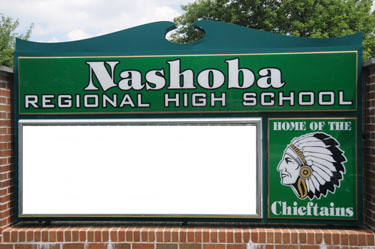
By Ann Needle
How to measure success was at the top of last night’s agenda for the Nashoba School Committee. Along with discussion of a new middle school report card came an announcement that the district will participate in a pilot program aimed at replacing the MCAS with national standards.
Scheduled to be in place by next year, the new middle school report card will continue to list traditional letter grades in each subject, according to Patrick Perkins, principal of Lancaster’s Luther Burbank Middle School and one of the new report card’s chief developers. The rest of the report card is devoted to assessing how a student is progressing in the standards set for each subject by the state. For instance, in Math, one of the tasks a sixth grader is expected to grasp by the end of the school year is the ability to demonstrate and apply concepts of statistics. Each trimester, the student can be rated on the standard anywhere from a 1 (not yet progressing) to a 4 (exceeds).
Currently, similar report cards are used in the elementary grades. Once this middle school report card is finalized, another version will be developed for Nashoba Regional High School.
Much of the debate among the Committee centered on why the new report card eliminates the practice of some teachers to award extra points to students who complete their homework on time, regardless of whether it is done correctly. Perkins explained that in the new system, homework, if graded, can be included in the subject’s letter grade calculation. “There will be assessments, done at home, that will be graded, so I think we need to re-define ‘homework’” he said.
“With traditional report cards, there are a lot of variables — and it’s not always about what a student can do,” he said. Throughout the district, Patrick maintained that simply completing homework can influence a student’s grade “anywhere from 5% to 30%.” Instead, homework completion will be assessed separately from letter grades, under “Social Behavior and Work Habits,” where a student can be rated on whether he or she “meets expectations for homework completion and quality.”
Committee Member Julie Fay of Lancaster commented that the lengthy format may be too much for some families to absorb. Referring to the time normally allotted to a parent/teacher conference in each subject, she remarked, “Parents are going to come to parent/teacher meetings and want to talk about this. All of this. In 10 minutes.”
“This is a work in progress,” Wood stressed. “Teachers are going to have to come to a consensus on if this works.”
Nashoba to Pilot MCAS Replacement
Hale’s seventh and eighth graders also have been tentatively selected to participate in piloting a new assessment system aimed at replacing MCAS. According to Michael Wood’s Superintendent’s Report, “The new assessments, Partnerships for Assessments of Readiness for College and Careers (PARCC), are a performance based assessment in that students will be given problems to solve and text to which to respond to construct new information, meaning or ideas.”
Wood remarked that the tests are based on the national Common Core State Standards (CCSS) that Massachusetts uses. About 15% of MA schools will be involved in the spring pilot. Though PARCC has selected which Nashoba schools will participate, Wood stressed the list is tentative.
As it stands, Hale seventh and eighth graders will take the Math PARCC, with two Math classes tested in each of these grades. At NRHS, two classes of Algebra I students also will take the Math PARCC. Some classes at Bolton’s Florence Sawyer and Lancaster’s Mary Rowlandson schools will take the PARCC in English Language Arts. The tests tentatively are scheduled for March, Wood said.
Though Wood said he has not decided whether students involved in this pilot should take both the PARCC pilot and MCAS, he is leaning toward both, “because if we don’t, we’ll lose a year of data.” Unlike the MCAS, participating families will receive their school’s overall score, rather than individual scores, he said. A PARCC Science assessment has not yet been developed.
If Massachusetts decides to go ahead with the PARCC system, Wood noted it is scheduled to be in place by the 2015/16 school year.
Outside of debating the latest news on assessments, the School Committee voted unanimously to amend the district’s new teacher assessment policy, which was approved at the last meeting. However, Wood said he inadvertently omitted language from this document, which was approved by the Personnel Subcommittee in early September.
In his financial update for the first quarter of fiscal year 2014, Asst. Superintendent George King reported that budget items he usually checks on to assure they are not turning into “budget busters” — including salaries, health insurance, and utilities— all appear under control. Also, hiring for the district is finished for the year, he added.
Finally, Wood announced that Bolton Committee Member Reta Rupich resigned. The town should be appointing her replacement within 30 days, he said.
